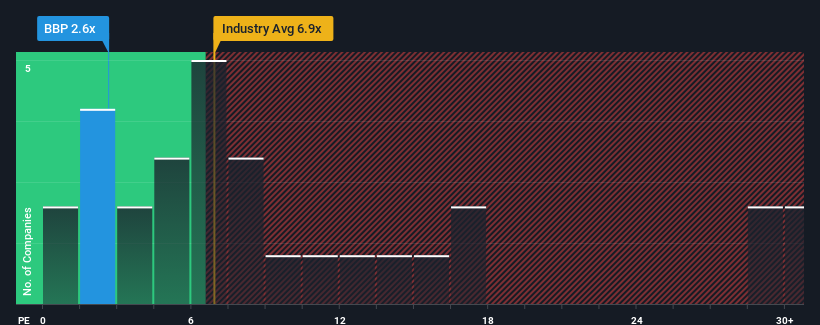- Singapore
- /
- Construction
- /
- SGX:BBP
Further Upside For Hor Kew Corporation Limited (SGX:BBP) Shares Could Introduce Price Risks After 60% Bounce

Hor Kew Corporation Limited (SGX:BBP) shares have continued their recent momentum with a 60% gain in the last month alone. Looking back a bit further, it's encouraging to see the stock is up 63% in the last year.
Although its price has surged higher, Hor Kew's price-to-earnings (or "P/E") ratio of 2.6x might still make it look like a strong buy right now compared to the market in Singapore, where around half of the companies have P/E ratios above 12x and even P/E's above 21x are quite common. However, the P/E might be quite low for a reason and it requires further investigation to determine if it's justified.
Hor Kew certainly has been doing a great job lately as it's been growing earnings at a really rapid pace. It might be that many expect the strong earnings performance to degrade substantially, which has repressed the P/E. If you like the company, you'd be hoping this isn't the case so that you could potentially pick up some stock while it's out of favour.
View our latest analysis for Hor Kew

What Are Growth Metrics Telling Us About The Low P/E?
Hor Kew's P/E ratio would be typical for a company that's expected to deliver very poor growth or even falling earnings, and importantly, perform much worse than the market.
Retrospectively, the last year delivered an exceptional 331% gain to the company's bottom line. The latest three year period has also seen an excellent 2,133% overall rise in EPS, aided by its short-term performance. Accordingly, shareholders would have probably welcomed those medium-term rates of earnings growth.
Weighing that recent medium-term earnings trajectory against the broader market's one-year forecast for expansion of 12% shows it's noticeably more attractive on an annualised basis.
In light of this, it's peculiar that Hor Kew's P/E sits below the majority of other companies. Apparently some shareholders believe the recent performance has exceeded its limits and have been accepting significantly lower selling prices.
The Bottom Line On Hor Kew's P/E
Hor Kew's recent share price jump still sees its P/E sitting firmly flat on the ground. Generally, our preference is to limit the use of the price-to-earnings ratio to establishing what the market thinks about the overall health of a company.
Our examination of Hor Kew revealed its three-year earnings trends aren't contributing to its P/E anywhere near as much as we would have predicted, given they look better than current market expectations. When we see strong earnings with faster-than-market growth, we assume potential risks are what might be placing significant pressure on the P/E ratio. At least price risks look to be very low if recent medium-term earnings trends continue, but investors seem to think future earnings could see a lot of volatility.
You always need to take note of risks, for example - Hor Kew has 2 warning signs we think you should be aware of.
It's important to make sure you look for a great company, not just the first idea you come across. So take a peek at this free list of interesting companies with strong recent earnings growth (and a low P/E).
Valuation is complex, but we're here to simplify it.
Discover if Hor Kew might be undervalued or overvalued with our detailed analysis, featuring fair value estimates, potential risks, dividends, insider trades, and its financial condition.
Access Free AnalysisHave feedback on this article? Concerned about the content? Get in touch with us directly. Alternatively, email editorial-team (at) simplywallst.com.
This article by Simply Wall St is general in nature. We provide commentary based on historical data and analyst forecasts only using an unbiased methodology and our articles are not intended to be financial advice. It does not constitute a recommendation to buy or sell any stock, and does not take account of your objectives, or your financial situation. We aim to bring you long-term focused analysis driven by fundamental data. Note that our analysis may not factor in the latest price-sensitive company announcements or qualitative material. Simply Wall St has no position in any stocks mentioned.
About SGX:BBP
Hor Kew
An investment holding company, provides an integrated range of construction related products and services in Singapore.
Flawless balance sheet with solid track record.
Market Insights
Community Narratives



